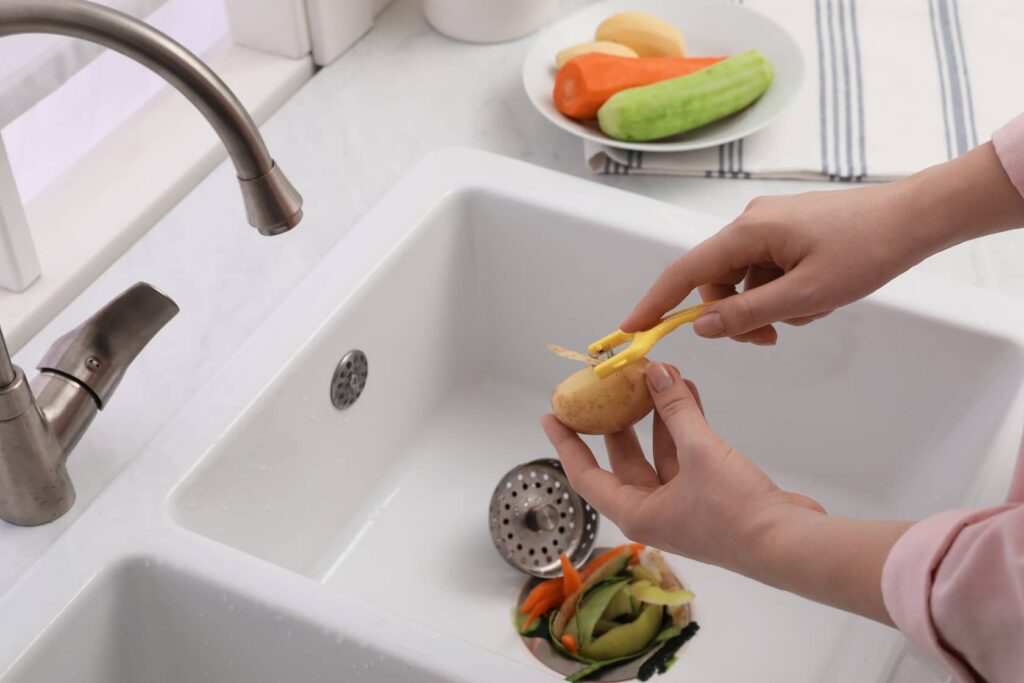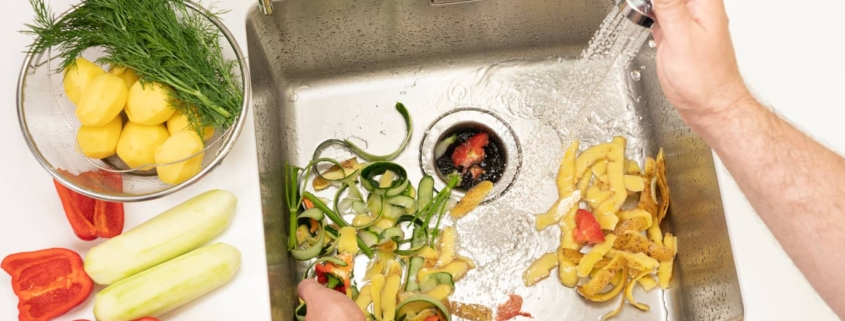When you purchase a home, oftentimes you are looking for as many perks and amenities as you can get. In many cases, one of those amenities is a garbage disposal. Homeowners love having garbage disposal to help them cut down on food waste being discarded into the trash can. What can go in a garbage disposal? Vegetables and fruits that do not have peels, soft foods that aren’t starchy, and ice are all ok.
Let’s take a look below at some more details regarding garbage disposals.
What Is A Garbage Disposal?
If you happen to have a garbage disposal, then you are in luck. These appliances are great at reducing food waste by shredding the excess food into tiny particles to be washed down the drain line. Garbage disposals are used to keep solid foods from clogging up your P-trap. The P-trap is located under the sink drain and is necessary to keep sewer gases from entering your home.

Which Items Are Safe To Put Down A Garbage Disposal?
Believe it or not, knowing which items are safe to go into your garbage disposal and not safe to go in is important. If you put the wrong food items into your garbage disposal you can cause a clog or even damage your plumbing. Let’s take a look below at what is good to go into the garbage disposal.
- Ice – Putting ice cubes into the garbage disposal helps clear food particles that have stuck to the walls of the disposal. Also, the ice can help keep your blades sharpened inside the disposal as the ice bounces around and gets shredded.
- Soft or liquid foods – Essentially, any type of food that has the same consistency as baby food. Vegetables and fruits that do not have their peels or skin on them are good to be put into the disposal unit.
- Citrus fruit – Using citrus fruit in your garbage disposal is a great way to kill the bacteria in the unit and keep it smelling fresh. Use oranges, lemons, or other citrus fruits without the peels to keep your garbage disposal smelling divine.
What Should Never Go In A Garbage Disposal?
Knowing what you can put down a garbage disposal is a great first step. However, there are many food items that should never go down a garbage disposal. Certain food could cause damage to your disposal or plumbing and create many headaches for the homeowner. Let’s take a look below at what food items we should avoid putting down the garbage disposal.
- Egg shells or coffee grounds – The reason why these food items are not good for disposal is due to their tiny nature. Also, keep items that are so small that they could get stuck under the blades of the disposal. . Additionally, any small food will stick to the walls of the garbage disposal.
- Banana peels, potato peels, Corn husks, or onion skins – any food that has stringy fibers in it are not good for the blades in the disposal. The stringy peels can clog your disposal and create a backup of water in your plumbing.
- Starchy foods – Keep pasta and rice, peanut butter, or other grease oils from going down the disposal. They can solidify and expand as water is added or removed.
- Lack of water – Anytime that you are flushing the food down into the garbage disposal you need to make sure that your run cold water. Having running water helps rinse the disposal as it shreds the food.
Other Recommended Maintenance
Now that you are aware of what you can and cannot put down the disposal, you should read up on how to loosen a tight P-trap. If the P-trap is getting clogged you will need to loosen and remove the P-trap for proper cleaning. Also, if you don’t have the tools to do this, call on your local master plumber.
Next, be sure to read up on how long your garbage disposal should last. You don’t want to be caught off guard by an added appliance expense. Especially, if you can avoid abusing your disposal by putting the correct foods down it.
Lastly, another area of plumbing that you need to be aware of is regarding your electric water heater. Also, if you turn on your faucets and no hot water comes out, you might need to reset your electric water heater. Reading up on how to do this is important for troubleshooting a solution. If you still cannot get the electric water heater to start, call on a licensed electrician to assist.
When Do I Call A Professional?
The moment that you notice your disposal is making noises, smelling bad, or getting clogged you should look to replace it. Cleaning your disposal with baking soda and vinegar is a great first step for keeping it from smelling. However, this might be a temporary fix. Also, be sure to rinse all food particles down the drain. This ensures it doesn’t sit and clog up your disposal. Additionally, if you continuously have disposal issues, call on a master plumber to come to assist. Additionally, reach out to your local home inspection team. Consequently, they can inspect your entire plumbing system and let you know if other repairs are needed.
Conclusion
Having the information of what can and cannot go down the disposal is invaluable to a homeowner. Most homeowners fail to even read the manufacturer’s recommendations. Starting with a quick list of what can and cannot go down the disposal is key. Be sure to reach out to your local home inspection team for a full plumbing inspection. Also, they can recommend a reputable master plumber for all of your plumbing needs. Call on Blue Guardian Home Inspections for a full home inspection in Kendall, Kane, Dupage, and LaSalle Counties of Illinois.

